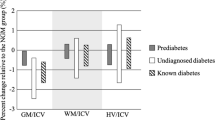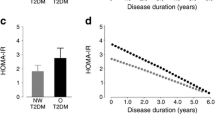Abstract
Type 1 diabetes has mild effects on cognition that are influenced by age of onset, hyperglycemia, and hypoglycemic episodes. Some of these changes occur quite early in the disease course. Studies using relatively new brain imaging techniques have also shown brain changes in adults and children that appear to be influenced by metabolic abnormalities present in diabetes. Early detections of brain changes may be early indicators of subsequent cognitive abnormalities.
Similar content being viewed by others
References and Recommended Reading
Brands AM, Biessels GJ, de Haan EH, et al.: The effects of type 1 diabetes on cognitive performance: a meta-analysis. Diabetes Care 2005, 28:726–735.
Ryan CM: Neurobehavioral complications of type I diabetes. Examination of possible risk factors. Diabetes Care 1988, 11:86–93.
Northam EA, Anderson PJ, Werther GA, et al.: Neuropsychological complications of IDDM in children 2 years after disease onset. Diabetes Care 1998, 21:379–384.
Gold AE, Deary IJ, Frier BM: Recurrent severe hypoglycaemia and cognitive function in type 1 diabetes. Diabet Med 1993, 10:503–508.
Ryan CM, Williams TM, Finegold DN, Orchard TJ: Cognitive dysfunction in adults with type 1 (insulin-dependent) diabetes mellitus of long duration: effects of recurrent hypoglycaemia and other chronic complications. Diabetologia 1993, 36:329–334.
Ferguson SC, Blane A, Perros P, et al.: Cognitive ability and brain structure in type 1 diabetes: relation to microangiopathy and preceding severe hypoglycemia. Diabetes 2003, 52:149–156.
Ryan CM: Effects of diabetes mellitus on neuropsychological functioning: a lifespan perspective. Sem Clin Neuropsychiatry 1997, 2:4–14.
Northam EA, Anderson PJ, Jacobs R, et al.: Neuropsychological profiles of children with type 1 diabetes 6 years after disease onset. Diabetes Care 2001, 24:1541–1546.
Kaufman FR, Epport K, Engilman R, Halvorson M: Neurocognitive functioning in children diagnosed with diabetes before age 10 years. J Diabetes Complications 1999, 13:31–38.
Rovet JF, Ehrlich RM: The effect of hypoglycemic seizures on cognitive function in children with diabetes: a 7-year prospective study. J Pediatr 1999, 134:503–506.
Northam EA, Anderson PJ, Werther GA, et al.: Predictors of change in the neuropsychological profiles of children with type 1 diabetes 2 years after disease onset. Diabetes Care 1999, 22:1438–1444.
Effects of intensive diabetes therapy on neuropsychological function in adults in the Diabetes Control and Complications Trial [no authors listed]. Ann Intern Med 1996, 124:379–388.
Reichard P, Pihl M, Rosenqvist U, Sule J: Complications in IDDM are caused by elevated blood glucose level: the Stockholm Diabetes Intervention Study (SDIS) at 10-year follow up. Diabetologia 1996, 39:1483–1488.
Deary IJ, Frier BM: Severe hypoglycaemia and cognitive impairment in diabetes: link not proven. BMJ 1996, 313:767–768.
Jacobson AM, Musen G, Ryan CM, et al.: Long-term effect of diabetes and its treatment on cognitive function. N Engl J Med 2007, 356:1842–1852.
Ryan CM: Why is cognitive dysfunction associated with the development of diabetes early in life? The diathesis hypothesis. Pediatric Diabetes 2006, 7:289–297.
Ryan CM: Diabetes, aging, and cognitive decline. Neurobiol Aging 2005, 26(Suppl 1):21–25.
Ryan C, Geckle M, Orchard T: Cognitive efficiency declines over time in adults with type 1 diabetes: effects of micro-and macrovascular complications. Diabetologia 2003, 46:940–948.
Bolli GB: Treatment and prevention of hypoglycemia and its unawareness in type 1 diabetes mellitus. Rev Endocr Metab Disord 2003, 4:335–341.
Rosenthal JM, Amiel SA, Yaguez L, et al.: The effect of acute hypoglycemia on brain function and activation: a functional magnetic resonance imaging study. Diabetes 2001, 50:1618–1626.
Cox DJ, Penberthy JK, Zrebiec J, et al.: Diabetes and driving mishaps: frequency and correlations from a multinational survey. Diabetes Care 2003, 26:2329–2334.
Cryer PE: Iatrogenic hypoglycemia as a cause of hypoglycemia-associated autonomic failure in IDDM. A vicious cycle. Diabetes 1992, 41:255–260.
Fanelli CG, Epifano L, Rambotti AM, et al.: Meticulous prevention of hypoglycemia normalizes the glycemic thresholds and magnitude of most of neuroendocrine responses to, symptoms of, and cognitive function during hypoglycemia in intensively treated patients with short-term IDDM. Diabetes 1993, 42:1683–1689.
Amiel SA: Cognitive function testing in studies of acute hypoglycaemia: rights and wrongs? Diabetologia 1998, 41:713–719.
Dejgaard A, Gade A, Larsson H, et al.: Evidence for diabetic encephalopathy. Diabet Med 1991, 8:162–167.
Seidl R, Birnbacher R, Hauser E, et al.: Brainstem auditory evoked potentials and visually evoked potentials in young patients with IDDM. Diabetes Care 1996, 19:1220–1224.
Hauser E, Strohmayer C, Seidl R, et al.: Quantitative EEG in young diabetics. J Child Neurol 1995, 10:330–334.
Uccioli L, Parisi V, Monticone G, et al.: Electrophysiological assessment of visual function in newly-diagnosed IDDM patients. Diabetologia 1995, 38:804–808.
Parisi V, Uccioli L: Visual electrophysiological responses in persons with type 1 diabetes. Diabetes Metab Res Rev 2001, 17:12–18.
Ziegler O, Guerci B, Algan M, et al.: Improved visual evoked potential latencies in poorly controlled diabetic patients after short-term strict metabolic control. Diabetes Care 1994, 17:1141–1147.
Lippe S, Roy MS, Perchet C, Lassonde M: Electrophysiological markers of visuocortical development. Cereb Cortex 2007, 17:100–107.
Wozniak JR, Lim KO: Advances in white matter imaging: a review of in vivo magnetic resonance methodologies and their applicability to the study of development and aging. Neurosci Biobehav Rev 2006, 30:762–774.
Bryan RN, Cai J, Burke G, et al.: Prevalence and anatomic characteristics of infarct-like lesions on MR images of middle-aged adults: the atherosclerosis risk in communities study. AJNR Am J Neuroradiol 1999, 20:1273–1280.
Perros P, Deary IJ, Sellar RJ, et al.: Brain abnormalities demonstrated by magnetic resonance imaging in adult IDDM patients with and without a history of recurrent severe hypoglycemia. Diabetes Care 1997, 20:1013–1018.
Brands AM, Kessels RP, Hoogma RP, et al.: Cognitive performance, psychological well-being, and brain magnetic resonance imaging in older patients with type 1 diabetes. Diabetes 2006, 55:1800–1806.
Weinger K, Jacobson AM, Musen G, et al.: The effects of type 1 diabetes on cerebral white matter. Diabetologia 2008, In press.
Wu J, Perantie DC, Sadler M, et al.: Pilot diffusion tensor imaging study in youth with type 1 diabetes mellitus reveals changes in white matter integrity associated with chronic hyperglycemia. Diabetes 2007, 56(Suppl):A477.
Baron JC, Chetelat G, Desgranges B, et al.: In vivo mapping of gray matter loss with voxel-based morphometry in mild Alzheimer’s disease. Neuroimage 2001, 14:298–309.
Musen G, Lyoo IK, Sparks CR, et al.: Effects of type 1 diabetes on gray matter density as measured by voxel-based morphometry. Diabetes 2006, 55:326–333.
Wessels AM, Simsek S, Remijnse PL, et al.: Voxel-based morphometry demonstrates reduced grey matter density on brain MRI in patients with diabetic retinopathy. Diabetologia 2006, 49:2474–2480.
Perantie DC, Wu J, Koller JM, et al.: Voxel-based morphometry detects brain volume changes due to hypo-and hyperglycemia in youth with type 1 diabetes mellitus. Diabetes 2007, 56(Suppl):A476.
Raichle ME, MacLeod AM, Snyder AZ, et al.: A default mode of brain function. Proc Natl Acad Sci U S A 2001, 98:676–682.
Gusnard DA, Raichle ME: Searching for a baseline: functional imaging and the resting human brain. Nat Rev Neurosci 2001, 2:685–694.
Wessels AM, Rombouts SA, Simsek S, et al.: Microvascular disease in type 1 diabetes alters brain activation: a functional magnetic resonance imaging study. Diabetes 2006, 55:334–340.
De Stefano N, Filippi M: MR spectroscopy in multiple sclerosis. J Neuroimaging 2007, 17:31S–35S.
Minati L, Grisoli M, Bruzzone MG: MR spectroscopy, functional MRI, and diffusion-tensor imaging in the aging brain: a conceptual review. J Geriatr Psychiatry Neurol 2007, 20:3–21.
Wolfsdorf J, Glaser N, Sperling MA: Diabetic ketoacidosis in infants, children, and adolescents: a consensus statement from the American Diabetes Association. Diabetes Care 2006, 29:1150–1159.
Muir AB, Quisling RG, Yang MC, Rosenbloom AL: Cerebral edema in childhood diabetic ketoacidosis: natural history, radiographic findings, and early identification. Diabetes Care 2004, 27:1541–1546.
Wootton-Gorges SL, Glaser NS: Imaging of the brain in children with type I diabetes mellitus. Pediatr Radiol 2007, 37:863–869.
Silver SM, Clark EC, Schroeder BM, Sterns RH: Pathogenesis of cerebral edema after treatment of diabetic ketoacidosis. Kidney Int 1997, 51:1237–1244.
Kreis R, Ross BD: Cerebral metabolic disturbances in patients with subacute and chronic diabetes mellitus: detection with proton MR spectroscopy. Radiology 1992, 184:123–130.
Cameron FJ, Kean MJ, Wellard RM, et al.: Insights into the acute cerebral metabolic changes associated with childhood diabetes. Diabet Med 2005, 22:648–653.
Pouwels PJ, Brockmann K, Kruse B, et al.: Regional age dependence of human brain metabolites from infancy to adulthood as detected by quantitative localized proton MRS. Pediatr Res 1999, 46:474–485.
Sarac K, Akinci A, Alkan A, et al.: Brain metabolite changes on proton magnetic resonance spectroscopy in children with poorly controlled type 1 diabetes mellitus. Neuroradiology 2005, 47:562–565.
Author information
Authors and Affiliations
Corresponding author
Rights and permissions
About this article
Cite this article
Musen, G. Cognition and brain imaging in type 1 diabetes. Curr Diab Rep 8, 132–137 (2008). https://doi.org/10.1007/s11892-008-0024-z
Published:
Issue Date:
DOI: https://doi.org/10.1007/s11892-008-0024-z




